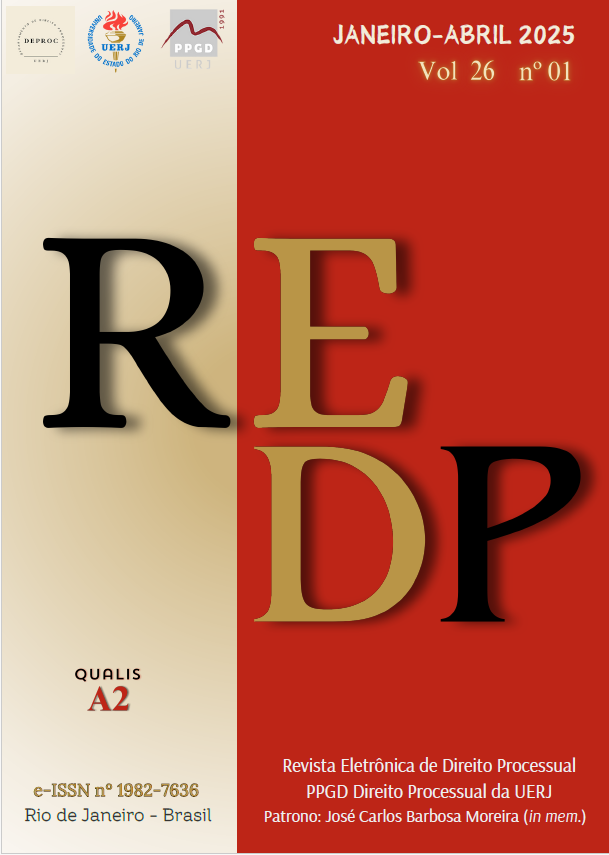UMA UMA ANÁLISE DECOLONIAL DO PROCESSO PENAL BRASILEIRO: O QUE A JUSTIÇA NEGOCIAL PREVISTA NO PROJETO DE LEI Nº 4.524/2019 PODE REPRESENTAR EM NOSSO CENÁRIO TROPICAL PERIFÉRICO
DOI:
https://doi.org/10.12957/redp.2025.84331Resumo
O trabalho propõe analisar o Projeto de Lei nº 4.524/2019, que autoriza Ministério Público e acusado a barganharem sobre o cumprimento de pena privativa de liberdade. O problema de pesquisa que exsurge é: considerando os motivos oficialmente declarados que fundamentam a inserção de tais institutos negociais na última década, a barganha sobre o tempo de cumprimento de pena privativa de liberdade, tal qual trazida pelo Projeto de Lei nº 4.524/2019, em uma perspectiva decolonial, potencialmente representa um retrocesso legislativo? O trabalho é pautado em dados documentais e bibliográficos, possui caráter eminentemente crítico-descritivo, versado a partir de metodologia dedutiva, e possui como marco teórico obras que versam sobre a colonização latino-americana, e os seus reflexos atuais, como as de Anibal Quijano, Raimundo Faoro, Frantz Fanon, dentre outros. Conclui que a incorporação abrasileirada da barganha sobre a pena privativa de liberdade prevista no Projeto de Lei nº 4.524/2019 se dá de forma indevida no ordenamento jurídico brasileiro, não projetando o sistema de justiça criminal para um horizonte despenalizador e decolonial. Ao contrário, em um cenário histórico-colonialmente estamental e racista, a referida proposta legislativa promoverá uma mera administrativização prisional de vulneráveis, potencializando o cenário punitivista através do fracassado sistema penitenciário brasileiro. Como instituto alienígena desconectado da realidade tropical, potencialmente se tornará um instrumento em desfavor dos direitos e das garantias fundamentais, dada a prejudicial conjuntura já sedimentada de um sistema de justiça criminal altamente autoritário, punitivista e desigual.
Downloads
Publicado
Como Citar
Edição
Seção
Licença
Copyright (c) 2024 Marlon Amaral Hungaro, Ricardo T. P. Genelhú

Este trabalho está licenciado sob uma licença Creative Commons Attribution 4.0 International License.
Todos os artigos publicados na Revista Eletrônica de Direito Processual (REDP) (Departamento de Direito Processual, Universidade do Estado do Rio de Janeiro, Brasil) são licenciados por meio de uma Licença Creative Commons - Atribuição 4.0 Internacional (CC BY 4.0).
Os autores retêm os direitos autorais de seu artigo e concordam em licenciar seu trabalho com a licença CC BY 4.0, aceitando assim os termos e condições específicos desta licença disponíveis no seguinte website: https://creativecommons.org/licenses/by/4.0/legalcode.
- Os autores concedem à REDP o direito de primeira publicação, de se identificar como publicadora original do trabalho e concedem à revista uma licença de direitos não exclusivos para utilizar o trabalho das seguintes formas: Reproduzir, vender e distribuir cópias eletrônicas ou impressas do manuscrito como um todo, de partes específicas do manuscrito e de suas traduções para qualquer idioma;
- O uso do artigo por terceiros é livre, contanto que a integridade da publicação seja mantida e seus autores originais, periódico de primeira publicação e detalhes de citação sejam identificados.
Dentro dos termos da licença, os autores podem entrar em acordos contratuais adicionais separados para a distribuição não exclusiva da versão publicada do trabalho na revista.
Copyright and Licensing
All articles published in the Procedural Law Electronic Review (REDP) (Department of Procedural Law, State University of Rio de Janeiro, Brazil) are licensed under a Creative Commons License - Attribution 4.0 International (CC BY 4.0).
- Authors retain copyright to their article and agree to license their work under the CC BY 4.0 license, thereby accepting the specific terms and conditions of this license available at the following website: https://creativecommons.org/licenses/by/4.0/ legal code.
- Authors grant REDP the right of first publication, to identify itself as the original publisher of the work, and grant the journal a non-exclusive license to use the work in the following ways: Reproduce, sell and distribute electronic or printed copies of the manuscript as a whole, of specific parts of the manuscript and its translations into any language;
- Use of the article by third parties is free, as long as the integrity of the publication is maintained and its original authors, first publication journal, and citation details are identified.
Within the terms of the license, authors may enter into separate additional contractual agreements for the non-exclusive distribution of the published version of the work in the journal.




